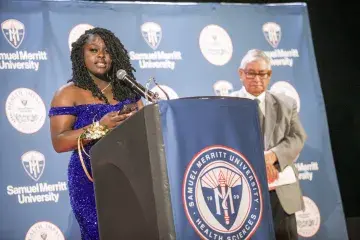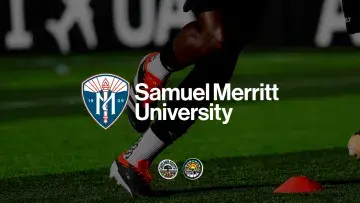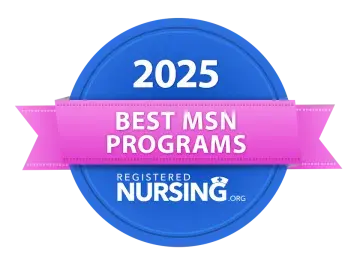SMU’s Community Nurse Corps May Serve as a National Model
A group of Samuel Merritt University “nurse scholars” who are providing free health education in Sacramento’s most impoverished neighborhoods are also learning lessons about how daily living challenges impact the health of low-income people.
They are the first members of a “community nurse corps” working in Sacramento’s promise zone, one of 22 distressed neighborhoods in select urban, rural and tribal communities across the country designated by the federal government for investments to expand economic opportunities and improve the quality of life.
Conceived by Samuel Merritt University’s (SMU) RN to BSN program to provide its students with public health experience, the community nurse corps may serve as a model for other U.S. promise zones.
“We are elated to have Samuel Merritt University as our partner in the promise zone,” said Tyrone Roderick Williams, who is heading up the initiative as director of development for the Sacramento Housing and Redevelopment Agency. He said that while Sacramento served as a launching pad for the nurse corps, he plans to share the idea with other promise zone leaders across the country.
Participating in the nurse corps for 90 hours over two semesters fulfills the clinical requirements of a community health course in the RN-to-BSN program. It also qualifies the registered nurses enrolled in the program to apply for Public Health Nurse certification upon graduation.
In addition to their studies, the first 11 nurses now working in the pioneering program all work full-time in acute-care units at Kaiser Permanente where they typically concentrate on getting their patients well enough to leave the hospital. They are not usually exposed to the social and economic challenges that some of their patients face to continue their recovery and achieve better health.
“They’re very focused in that narrow lens and many of them lack an understanding of what’s going on in the community driven by the social determinants of health such as access to nutritional foods,” said Alice Jacobs Vestergaard, EdD, a clinical instructor and public health coordinator for the RN to BSN program.
Vestergaard, who initiated SMU’s collaboration with the Sacramento promise zone, said nurses who work in community settings sometimes have to function as social workers to help residents access healthcare and transportation services as well as navigate problems like domestic abuse and gang violence.
Launched in January, the community nurse corps is providing education and counseling on health issues such as diabetes and hypertension that are prevalent in low-income, minority neighborhoods. In turn, the participants are also learning about how the circumstances of the residents’ lives impact their health.
Jeanne Steer, who has been a hospital nurse for 20 years and currently works in a Kaiser recovery room, said performing clinical work in the community is giving her a better understanding of the factors that determine her patients’ health outcomes such as their immigration status and their ability to afford medications and travel to medical appointments.
“The public health experience will help me see past just getting them home,” said Steer. “It will give me the ability to look more closely at the whole patient.”
As a member of the community nurse corps, Steer is assigned to the Twin Rivers public housing complex near downtown Sacramento where she is focusing on prenatal care for pregnant women. Only one small food store that doesn’t accept food stamps is within walking distance of Twin Rivers, she said, and there is no convenient access to public transportation to get to a supermarket.
“I read the newspaper and watch the news so I hear about these things, but now I’m out in the community where I see poverty, racism and the lack of ability to buy healthy foods,” said Steer.
The nurse corps is also working at WellSpace Health medical clinic, La Familia Community Counseling Center and other community organizations working with Sacramento’s most vulnerable populations.
Vestergaard said the experience is proving eye-opening and transformational for the RN to BSN students, also called nurse scholars.
“In their regular jobs, they’re not used to dealing with people who fall through the cracks, people who are homeless, and people who can’t get access to care because they are undocumented,” she said.
The community nurse corps program furthers the mission of the RN to BSN program, which is designed to help working registered nurses in Northern California gain leadership and teamwork skills that will enable them to advance their careers and help transform healthcare delivery. Research shows that boosting educational levels among nurses improves patient safety and health outcomes because of the critical role nurses play in healthcare.
Steer said learning public health nursing is making her more empathetic to the plight of disadvantaged communities and is sharpening her ability to find existing resources to address their needs.
“It may be a direction I want to go in my career once I graduate,” said Steer.


